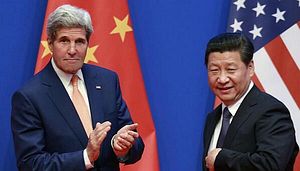As the competition between China and the United States intensifies, an interesting question is who is going to make more strategic mistakes or be more likely to make grave strategic mistakes. The answer to this question will partly determine who is going to win the competition and thus be able to shape international order according to their will. The surprising answer, however, is that the United States is more prone to a fatal strategic error. It is surprising because the U.S. is still the only superpower and much more powerful than China is. Being the more powerful side means that it has more room for strategic errors, and in this case, the U.S. might have more breathing room than China does. Nonetheless, the U.S. is still going to make more strategic mistakes than China does. Why?
Let us first examine the records of both countries’ foreign policies in the last 20 or so years since the end of the Cold War. The record of the U.S. foreign policy is not pretty after the end of the Cold War. As Stephen Walt points out, bad decisions often are made by states, especially great powers. The Iraq War is a big mistake for the U.S., as is the Afghan War. These two wars combined have cost the U.S. between $4 to 6 trillion , according to one study from Harvard University. More importantly, despite such huge costs and tens of thousands of lives lost during the wars, Iraq and Afghanistan are still a mess, as the emergence of ISIS in the former clearly demonstrates. Unfortunately, the U.S. foreign policy establishment does not seem to have learned the lessons yet, as hawks are again calling for intervention. And recently the U.S. is antagonizing both China and Russia simultaneously, which would be the biggest strategic mistake if China and Russia were to form an alliance against the U.S.
U.S. foreign policy suffers from two major structural problems: fragmentation, with certain key players and/or interest groups having too much influence as a result, and an expansionist liberal ideology.
One can argue, as Walt did, that a small group of neoconservatives engineered the very costly and wasteful Iraq war. Unfortunately for the U.S., it is impossible to limit the influence of such individuals or any other interest groups. Another example is the huge influence of the Israel lobby groups on U.S. foreign policy, as John Mearsheimer and Stephen Walt convincingly demonstrate. Also, the U.S. Congress hurts U.S. national interests, for example, by opposing UNCLOS despite the fact that many prominent U.S. military officials and politicians support its ratification. Again, in this case it is a small number of Republican Senators who strongly oppose any international treaty, which, in their view, would weaken American sovereignty.
Another structural problem in American foreign policy is its obsession with democracy promotion abroad. While democracy promotion might ultimately be a good goal, the way the U.S. has been doing it is problematic as it often uses force to impose democracy on other states. Scholars have shown that military intervention cannot generate sustainable democratic institutions. Perhaps the U.S. is too ambitious and tries to do too much too soon; it is time now to slow down and do less with restraint, as one prominent strategist argues. Unfortunately again, given the dominant position of liberal ideology within U.S. domestic politics, restraint will never be a popular option unless the U.S. were to suffer a catastrophic defeat.
In contrast, China’s foreign policy system is coherent and has long-term vision and strong leadership. China’s continuous rise in the last three decades is the best evidence to support the argument that China’s foreign policy overall has been effective. Unlike the U.S., no interest groups in China can hijack China’s foreign policy, although in recent years some players like major state-owned firms have become increasingly important in Chinese foreign policy. Still, the Chinese government maintains tight controls over them and can remove the top officials of these firms pretty much anytime Chinese top leaders see fit. Also, Chinese top leaders usually have 10 years of tenure, thereby enabling them to make long-term plans. Most importantly, Chinese leaders seem to understand the value of patience, as they tend to adopt gradual reforms instead of big-bang reforms to advance China’s national interests.
Make no mistake: the U.S. system is a strong one and overall it outperforms many other systems. However, U.S. foreign policy is not as effective as its domestic system. The argument here is not about whether an authoritarian regime is better than a democratic one when it comes to foreign policy making. This is a special comparison between China and the U.S. for the next 10 to 20 years. China might very well make grave foreign policy mistakes or might not have a coherent foreign policy, but this is unlikely for the reasons outlined above.
No political system is perfect and as such any system needs constant reform. Currently China’s system is engaging in serious reforms whereas the U.S. system is stuck in political gridlock. Unless the U.S. system starts to reform itself quickly, several foreign policy strategic mistakes are bound to happen.

































